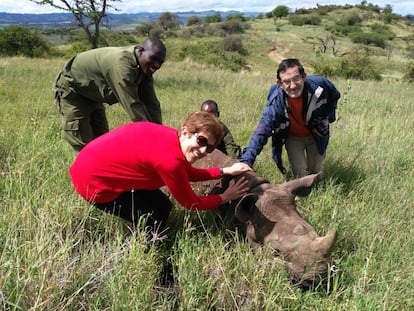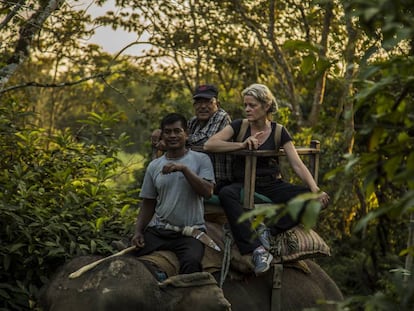Meet the Spaniards fighting to save elephants and rhinos in Kenya
Two professors from Galicia are studying parasitical infections to help the endangered mammals recover

Patrocinio Morrondo and Pablo D¨ªez Ba?os have just come back from an eventful trip to Kenya. But it wasn¡¯t exactly a vacation. Both are professors in the area of animal health at Lugo¡¯s Veterinary School, part of the University of Santiago de Compostela, and they traveled to the African country to help oversee a study into samples of feces, blood and parasites in elephants and rhinoceroses.
The elephant population has dropped drasticallyProfessor Patrocinio Morrondo
The samples will be analyzed to identify exactly what parasitic species are attacking these animals, which are in danger of extinction in Africa (although the populations in Kenya is stable), and how they could affect survival rates.
Morrondo and D¨ªez are part of the Animal Health Investigation Group?(Invesaga) in Galicia which works within the Veterinary School of Lugo. Invesaga in turn is collaborating with the Kenya Wildlife Service, and the? Multidisciplinary Study of Ruminant Animals network (Rumigal) in Galicia on a project to identify the parasitic infections that affect rhinos and elephants on natural reserves across Kenya.
¡°It has been an unforgettable experience,¡± says Morrondo, who details how the animals are anesthetized ¨C a process which made a big impression on her. The animals are shot from the safety of a helicopter, she says, then run desperately to escape.
When the animals finally fall over, they are surrounded by off-road jeeps carrying vets, biologists, environmental scientists and scouts. ¡°We immediately cover their heads with a blanket to limit their vision and when the anesthetizing process is complete, we can start to take samples.¡±
Morrondo praises the work of the specialists from the Veterinary School at the University of Kenya: ¡°of the 23 public universities in the country, this is the one that has produced the largest number of veterinarians,¡± she points out. Budding vets take part in this research work as part of their doctoral thesis, which is overseen by the two Galician university professors.
The professors from Galicia are working with students from the University of Kenya
Samer Alasaad, from the Institute of Evolutionary Biology and Environmental Studies (IEBES) at the University of Z¨¹rich, and Ram¨®n Casimiro-Soriguer, a researcher at the Spanish National Research Council (CSIC), asked the couple to supervise the student theses.?Morrondo and D¨ªez had already? worked on various wildlife projects, including monitoring the health of Spanish roe deer, which was a joint project between the Spanish Roe Deer Association and Invegasa.
¡°Both doctors are epidemiologists, not parasitologists, which is why they asked for our help in guiding the doctoral theses of the two Kenyan researchers,¡± says Marrondo.
Marrondo is supervising a doctoral thesis which tries to determine the level of parasitic infection in elephants on the Maasai Mara National Reserve and in the Tsavo Este National Park. It also analyzes the negative impact of the infection on the species¡¯ survival in Kenya.
¡°The elephant population level has dropped drastically because of poachers and traps that locals use to prevent the animals from trampling their gardens, which happens no matter how enclosed the nature park is,¡± she explains.
Meanwhile, D¨ªez Ba?o is overseeing a thesis that focuses on the demographics of the black rhinoceros in the east of the country and how their transfer to other nature parks might impact other animals, given that parasites can be passed on through ticks, which commonly affect rhinos. Like elephants, in the last couple of years, the black rhino population has decreased dramatically (mainly because of poachers in the area).
¡°Naturally, we didn¡¯t bring the samples, they would¡¯ve stopped us at the airport!¡± says Morrondo jokingly as she explains that the first round of analysis will be done by doctoral candidates in Kenya, ¡°where they have very good labs to work in.¡± Once these basic studies are complete, the rest of the research will be completed in Lugo.
¡°First we¡¯ll have to identify the type of parasite the animals have, and determine as well the extent of their influence on the animals or if the animals have adapted to them, and also how they will be affected by the move to other reserves.¡± Then, they can set about finding a remedy.
English version by Laura Rodr¨ªguez.?
Tu suscripci¨®n se est¨¢ usando en otro dispositivo
?Quieres a?adir otro usuario a tu suscripci¨®n?
Si contin¨²as leyendo en este dispositivo, no se podr¨¢ leer en el otro.
FlechaTu suscripci¨®n se est¨¢ usando en otro dispositivo y solo puedes acceder a EL PA?S desde un dispositivo a la vez.
Si quieres compartir tu cuenta, cambia tu suscripci¨®n a la modalidad Premium, as¨ª podr¨¢s a?adir otro usuario. Cada uno acceder¨¢ con su propia cuenta de email, lo que os permitir¨¢ personalizar vuestra experiencia en EL PA?S.
?Tienes una suscripci¨®n de empresa? Accede aqu¨ª para contratar m¨¢s cuentas.
En el caso de no saber qui¨¦n est¨¢ usando tu cuenta, te recomendamos cambiar tu contrase?a aqu¨ª.
Si decides continuar compartiendo tu cuenta, este mensaje se mostrar¨¢ en tu dispositivo y en el de la otra persona que est¨¢ usando tu cuenta de forma indefinida, afectando a tu experiencia de lectura. Puedes consultar aqu¨ª los t¨¦rminos y condiciones de la suscripci¨®n digital.










































